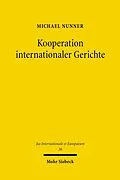Michael Nunner shows that international courts preserve the unity and the integrity of international law by recognizing and referring to the decisions of other courts.
Since the end of the 20th century, the number of international courts and tribunals has more than tripled, which means that an increasing number of international disputes are being settled peacefully in judicial proceedings. This development has aroused fears that the marginal external coordination of the courts could lead to a fragmentation of international law and could weaken the peaceful settlement of disputes. Based on a study of just under 300 decisions made in seven major jurisdictions, Michael Nunner disproves this theory. International courts preserve the unity and the integrity of international law by establishing a non-hierarchical discourse and by recognizing and referring to the decisions of other courts. Using a game theory analysis, it is possible to identify the long-term interests of the courts and reciprocal cooperation as fundamental causes of this reception and to document the evolution of the cooperation between courts.
Autorentext
Geboren 1976; Studium der Rechtswissenschaft und der Soziologie in Regensburg und Paris; 2008 Promotion; Staatsanwalt bei der Staatsanwaltschaft München I.
Since the end of the 20th century, the number of international courts and tribunals has more than tripled, which means that an increasing number of international disputes are being settled peacefully in judicial proceedings. This development has aroused fears that the marginal external coordination of the courts could lead to a fragmentation of international law and could weaken the peaceful settlement of disputes. Based on a study of just under 300 decisions made in seven major jurisdictions, Michael Nunner disproves this theory. International courts preserve the unity and the integrity of international law by establishing a non-hierarchical discourse and by recognizing and referring to the decisions of other courts. Using a game theory analysis, it is possible to identify the long-term interests of the courts and reciprocal cooperation as fundamental causes of this reception and to document the evolution of the cooperation between courts.
Autorentext
Geboren 1976; Studium der Rechtswissenschaft und der Soziologie in Regensburg und Paris; 2008 Promotion; Staatsanwalt bei der Staatsanwaltschaft München I.
Titel
Kooperation internationaler Gerichte
Untertitel
Lösung zwischengerichtlicher Konflikte durch herrschaftsfreien Diskurs
Autor
EAN
9783161511752
ISBN
978-3-16-151175-2
Format
E-Book (pdf)
Hersteller
Herausgeber
Digitaler Kopierschutz
Adobe-DRM
Dateigrösse
3.42 MB
Anzahl Seiten
515
Jahr
2009
Untertitel
Deutsch
Lesemotiv
Unerwartete Verzögerung
Ups, ein Fehler ist aufgetreten. Bitte versuchen Sie es später noch einmal.
